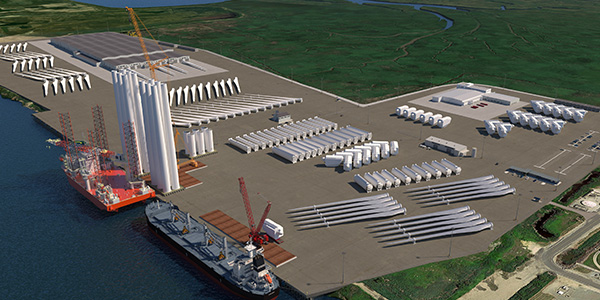New Jersey’s Board of Public Utilities on Wednesday backed a plan to create a wind energy manufacturing and transportation hub in South Jersey, signing a collaboration agreement with the state’s economic development agency and allocating $13.2 million to the New Jersey Wind Port project.
As they voted to back the memorandum of understanding with the New Jersey Economic Development Authority, BPU commissioners described the 200-acre project as a game-changing initiative that could help New Jersey become the center of the offshore wind energy sector on the mid-Atlantic Coast.
Gov. Phil Murphy announced plans for the New Jersey Wind Port, which is expected to cost $300 million to $400 million, in June, saying it would be the focus of essential staging, assembly, and manufacturing activities related to offshore wind projects on the East Coast. (See NJ Releases Draft Offshore Wind Plan.) Located in Lower Alloways Creek in Salem County, the project’s first phase is expected to begin this year with the development of a 30-acre marshaling site and a 25-acre manufacturing facility. A second phase would add a 150-acre site for marshaling and manufacturing of turbine components.
Wind power is a key element in Murphy’s plan for the state to achieve 100% clean energy by 2050. The governor wants the state to generate 7,500 MW of OSW by 2035.
The wind project “really positions New Jersey to be the supply chain for the entire” wind energy industry, said BPU president Joseph Fiordaliso, speaking before the five-member board, which unanimously backed the agreement with the NJEDA. “The funding really positions New Jersey as the hub for offshore wind.”
Echoing Fiordaliso, BPU Commissioner Bob Gordon said, “New Jersey has the opportunity to become the nexus for the entire offshore wind industry along the Atlantic [Coast], from Virginia to New York. And this wind port will be a critical element of that, and certainly a catalyst for a whole new industry.”
Second Wind Project Soon
The funds approved by the BPU as part of the agreement with the NJEDA will pay for early design work, site preparation and establishing a reliable power connection to the wind port. The money will come from the state’s “societal benefits charge,” a fee included in consumers’ electric bills to pay for programs that provide societal benefits such as low-income programs, nuclear decommissioning and funding for energy efficiency.
Murphy’s $44.8 billion budget, released in February, included $200 million for the New Jersey Wind Port project. And the NJEDA in March approved an increase of $354,854 in the engineering contract held by Moffatt & Nichol, to $9.5 million, to create an electricity substation and distribution system. The agency has spent $22.1 million on the wind port so far.
The biggest push to date in the state’s effort to jump start the wind sector was the selection of Ørsted’s to build a 1,100-MW Ocean Wind project, which gained BPU approval in June 2019. (See Orsted Wins Record Offshore Wind Bid in NJ.) The project is expected to provide clean electricity for 500,000 homes. The selection was the result of the state’s first OSW power solicitation, and the award was the largest wind project award in the U.S.
The BPU is now considering applications for a second offshore wind solicitation, with a goal of generating 1,200 to 2,400 MW. (See New Jersey BPU Oks 2nd Offshore Wind Solicitation.)The winning project is expected to be announced in the Spring, and a third solicitation is expected, for 1,200 MW, next year.
Wind power is not universally embraced, however, with some residents along the Jersey Shore opposing the construction of wind turbines out of concern that the site may deter visitors and damage the shore’s tourism and fishing industries.
PSEG-Ørsted Partnership
In a related development, the BPU on Wednesday also approved Public Service Enterprise Group subsidiary PSEG Renewable Generation’s acquisition of a 25% interest in Ørsted’s Ocean Wind project.
PSEG Renewable’s petition to the board said that after the acquisition, the company would lead the development, permitting and construction of the onshore portion of the project. The company will also be responsible for scheduling and dispatch of the project’s energy output once it starts operating, according to the BPU.
BPU staff who reviewed the petition and recommended that the board support it said PSEG would bring significant experience and knowledge of New Jersey’s energy infrastructure to the project, which would help mitigate schedule and cost risks for ratepayers. Staff also told the board that PSEG would increase the project’s access to energy marketing and hedging, strategies that are important in optimizing revenues credited back to ratepayers.
Speaking during PSEG’s 2020 fourth-quarter earnings call in February, CEO Ralph Izzo said the company was taking a cautious approach to offshore development. (See PSEG Presses for Higher Nuke Subsidies.)
“The commercial risk is completely mitigated by the [power purchase agreement with New Jersey]. And the operational risk is mitigated by making sure you partner with a world-class partner. And we think we have that in Ørsted,” he said.





